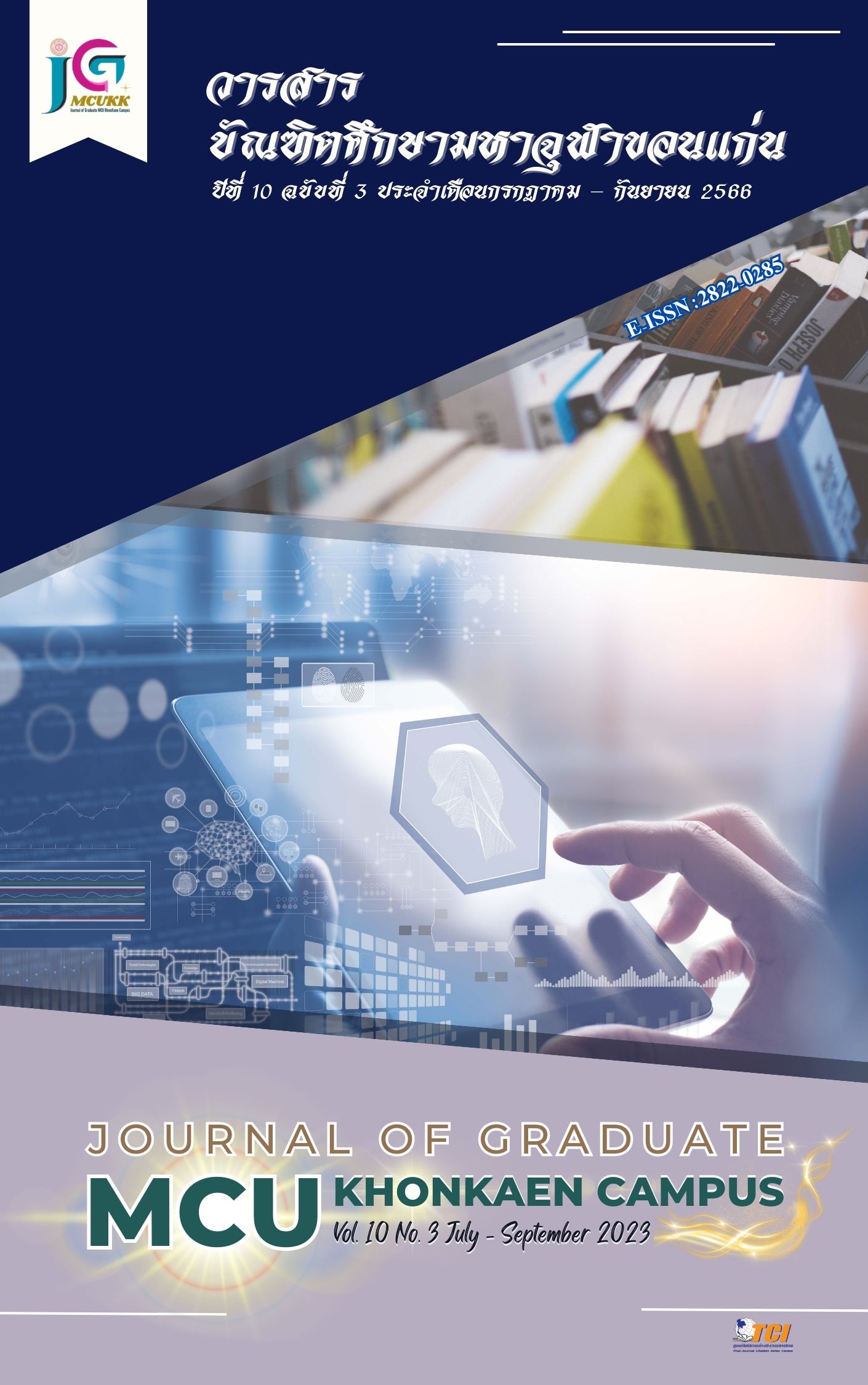Personnel Administration on the Saranee Dhamma 6 Principles of Educational Institution Administrators under Roi Et Primary Educational Service Area Office 1
Main Article Content
Abstract
This research aims to 1) study personnel management according to the Saranee Dhamma 6 Principles of Educational Institution Administrators under Roi Et Primary Educational Service Area Office 1, 2) to compare personnel management according to the Saranee Dhamma 6 Principles of educational administrators, classified by position, education background, and work experience, and 3) to study the approach to personnel management according to the Saranee Dhamma 6 Principles of educational administrators among a sample group of 335 administrators and teachers. The research tools used are a questionnaire with an estimated reliability of 0.87, and an IOC value between 0.67-1.00, and statistical analysis tools including frequency, percentage, mean, standard deviation, independent t-test, and one-way ANOVA F-test.
The results show that:
1) Personnel management in accordance with the 6 Principles is generally practiced to the highest level. The aspects ranked by average from highest to lowest are: development of civil service teachers and educational personnel, recruitment and appointment, plan on staff, management on salary increments, and job performance evaluation.
2) The results of comparing opinions on personnel management according to the 6 Principles of the Saranee Dhamma have no difference based on position and educational level, while there is a significant statistical difference in opinions based on work experience at a level of .05.
3) The guidelines for personnel management based on the 6 Principles of the Saranee Dhamma found 5 crucial necessities. First, workforce planning should prioritize implementation according to the plan. The structure and responsibilities of personnel should be clearly defined and appropriate for the educational institution. Second, recruitment and appointment should be determined by the educational qualifications, knowledge, and abilities that match the position without discrimination and with equality. Next, actions related to salary raises should have a salary review committee appointed by management to conduct transparent salary review meetings that can be verified by using an impartial method. Performance evaluations should be considered with fairness and impartiality, without any bias towards any individual within the organization. Ultimately, development of civil servants and educational personnel should be supported by funding for training.
Article Details

This work is licensed under a Creative Commons Attribution-NonCommercial-NoDerivatives 4.0 International License.
References
พระพรหมคุณาภรณ์ (ป.อ.ปยุตโต). (2556). พุทธธรรม ฉบับขยายความ. (พิมพ์ครั้งที่ 32). กรุงเทพฯ: กองทุน ป.อ.ปยุตฺโต เพื่อเชิดชูธรรม.
พระมหาพัฒนา วฑฺฒนญาโณ (มาตสีหา). (2564). แนวทางการบริหารงานบุคคลตามหลักสาราณียธรรม 6 ของผู้บริหารโรงเรียนพระปริยัติธรรมแผนกสามัญศึกษา จังหวัดเพชรบูรณ์. (วิทยานิพนธ์ครุศาสตรมหาบัณฑิต สาขาวิชาพุทธบริหารการศึกษา). พระนครศรีอยุธยา: มหาวิทยาลัยมหาจุฬาลงกรณราชวิทยาลัย.
พีระเชษฐ์ ชูโลก. (2559). การนำหลักสาราณียธรรม 6 มาใช้ในการบริหารสถบริหารของผู้บริหารโรงเรียน ในเขตอำเภอลานสกา สังกัดสำนักงานเขตพื้นที่ประถมศึกษานครศรีธรรมราชเขต 1. (สารนิพนธ์ ศึกษาศาสตรมหาบัณฑิต สาขาการบริหารการศึกษา). พระนครศรีอยุธยา: มหาวิทยาลัยมหาจุฬาลงกรณราชวิทยาลัย.
มณีนุช การุญ. (2562). สภาพปัญหา ผลสำเร็จและแนวทางพัฒนาการบริหารงานบุคคลในโรงเรียนมัธยมศึกษา สังกัดสำนักงานเขตพื้นที่การศึกษามัธยมศึกษา เขต 21. วารสารบริหารการศึกษาและภาวะผู้นำ มหาวิทยาลัยราชภัฏสกลนคร, 5(19), 106-114.
ยศพัทธ์ เที่ยงผดุง. (2565). การบริหารงานบุคคลตามหลักสาราณียธรรม 6 ในสถานศึกษาสังกัดสำนักงานเขตพื้นที่การศึกษาประถมศึกษาร้อยเอ็ดเขต 3. Journal of Modern Learning Development, 7(6), 30-41.
สำนักงานเขตพื้นที่การศึกษาประถมศึกษาร้อยเอ็ด เขต 1. (2563). แผนพัฒนาการจัดการศึกษาขั้นพื้นฐานสำนักงานเขตพื้นที่การศึกษาประถมศึกษาร้อยเอ็ด เขต 1 ประจำปีงบประมาณ พ.ศ. 2563 - 2566. ร้อยเอ็ด : สำนักงานเขตพื้นที่การศึกษาประถมศึกษาร้อยเอ็ดเขต 1
อัครพล นกทอง. (2564). แนวทางการบริหารสถานศึกษาตามหลักสาราณียธรรม 6 ของโรงเรียนในอำเภอชุมแสง จังหวัดนครสวรรค์. วารสารบัณฑิตศึกษาปริทรรศน์ วิทยาลัยสงฆ์นครสวรรค์, 9(1), 1-12.
Krejcie, R.V., & Morgan, D. W. (1970). Determining sample size for research activities. Educational and Psychological Measurement, 30(3), 607–610.

